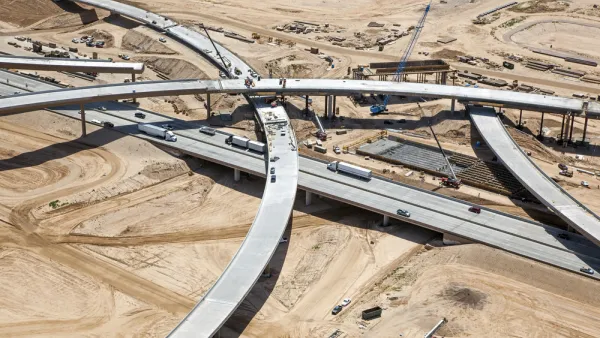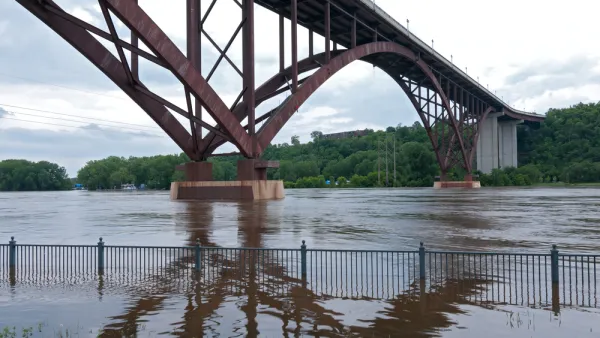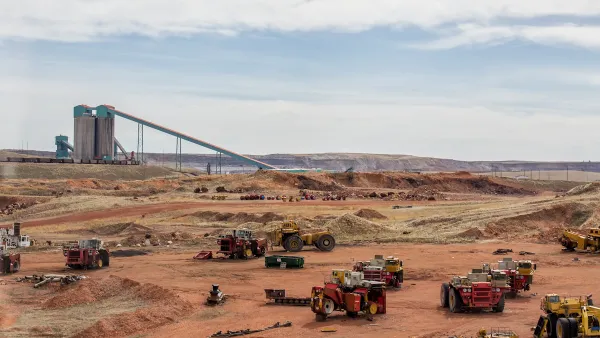In a move called "one of the biggest — and most audacious — deregulatory actions of the Trump administration," President Trump yesterday announced plans to weaken the National Environmental Policy Act for federal infrastructure projects.

"President Trump on Wednesday unilaterally weakened one of the nation’s bedrock conservation laws, the National Environmental Policy Act, limiting public review of federal infrastructure projects to speed up the permitting of freeways, power plants and pipelines," reports Lisa Friedman.
"In doing so, the Trump administration claimed it will save hundreds of millions of dollars over almost a decade by significantly reducing the amount of time allowed to complete reviews of major infrastructure projects."
The move culminates years of small steps and threats (or promises, depending on your perspective), to ease permitting processes for infrastructure projects in the United States by rolling back the protections of NEPA.
- During the State of the Union delivered in January 2018, for instance, President Trump promised to ease permitting processes but without mentioning specifics.
- In April 2018, "Trump administration agencies, including Transportation, Housing, Interior and Energy, signed an administration memo Monday pledging to speed up permitting on major infrastructure projects using a two-year target," according to an article by Michael Laris, but no specific mention of NEPA yet.
- In August 2018, the Trump administration's focus on NEPA became a little more clear, as the U.S. Department of Transportation announced new policies that required much shorter NEPA documentation, and located oversight of NEPA processes to one federal agency.
- Lisa Friedman reported in January 2020 on a proposed rule that removed the requirement to consider climate change in NEPA reviews. Additional coverage by The Washington Post and Yale Climate Connections offers additional insight about the potential consequences of the proposed rule change.
- And then in June 2020, the Trump administration was reported to be in preparation of an executive order waving protections of both NEPA and the Endangered Species Act.
Regarding more specific details of the changes enacted by President Trump this week, Friedman explains:
The final rule sets new hard deadlines of between one and two years to complete environmental studies, according to two people who have seen the document but were not authorized to speak about it publicly.
The rule will also allow agencies to develop categories of activities that do not require an environmental assessment at all.
And in one of the most bitterly contested provisions, the rule would free federal agencies from having to consider the impacts of infrastructure projects on climate change. It does so by eliminating the need for agencies to analyze a project’s indirect or “cumulative” effects on the environment and specifying they are only required to analyze “reasonably foreseeable” impacts.
President Trump announced the change during an appearance at the U.P.S. Hapeville Airport Hub in Atlanta. The Associated Press provided a report on the announcement as well. In each article, critics are quick to speak out against the changes, and predict that rolling back NEPA will fail to provide an economic boost, as president Trump promises.
FULL STORY: Trump Weakens Major Conservation Law to Speed Construction Permits

National Parks Layoffs Will Cause Communities to Lose Billions
Thousands of essential park workers were laid off this week, just before the busy spring break season.

Retro-silient?: America’s First “Eco-burb,” The Woodlands Turns 50
A master-planned community north of Houston offers lessons on green infrastructure and resilient design, but falls short of its founder’s lofty affordability and walkability goals.

Delivering for America Plan Will Downgrade Mail Service in at Least 49.5 Percent of Zip Codes
Republican and Democrat lawmakers criticize the plan for its disproportionate negative impact on rural communities.

Test News Post 1
This is a summary

Test News Headline 46
Test for the image on the front page.

Balancing Bombs and Butterflies: How the National Guard Protects a Rare Species
The National Guard at Fort Indiantown Gap uses GIS technology and land management strategies to balance military training with conservation efforts, ensuring the survival of the rare eastern regal fritillary butterfly.
Urban Design for Planners 1: Software Tools
This six-course series explores essential urban design concepts using open source software and equips planners with the tools they need to participate fully in the urban design process.
Planning for Universal Design
Learn the tools for implementing Universal Design in planning regulations.
EMC Planning Group, Inc.
Planetizen
Planetizen
Mpact (formerly Rail~Volution)
Great Falls Development Authority, Inc.
HUDs Office of Policy Development and Research
NYU Wagner Graduate School of Public Service





























